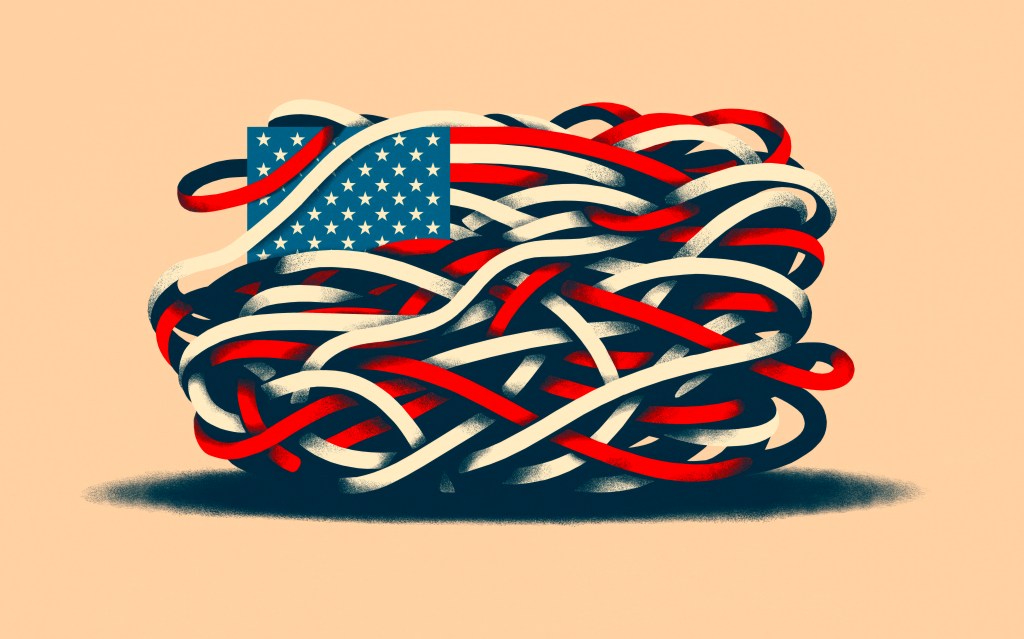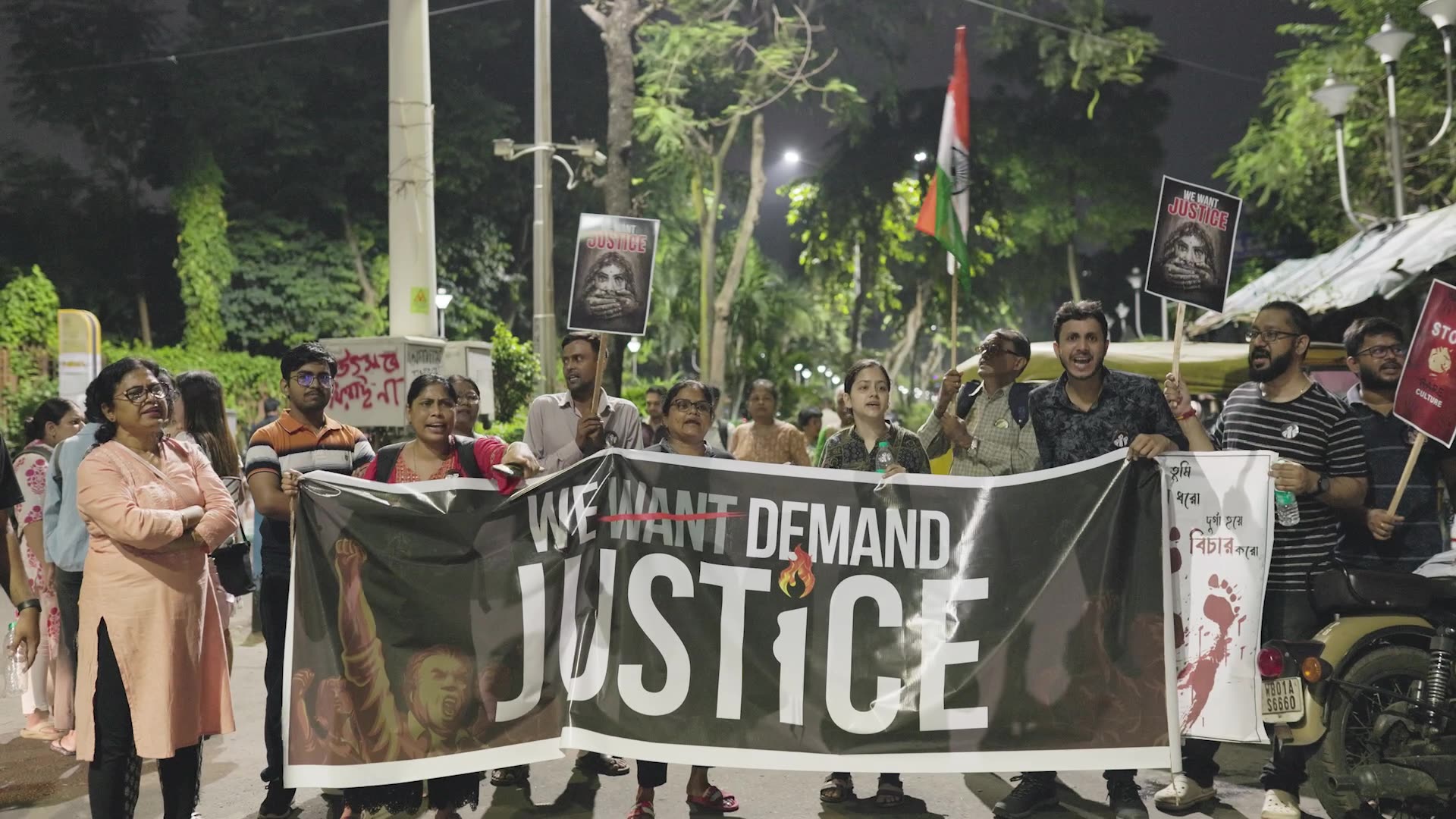On Aug. 9, the body of a 31-year-old trainee doctor was discovered on the grounds of R.G. Kar Medical College and Hospital in Kolkota, West Bengal. Evidence of sexual assault on the victim’s body was quickly reported, setting off a national firestorm across India. For months, women and medical professionals around the country have protested to demand justice for the victim and workplace safety. The Real News reports from Kolkota, West Bengal.
Production: Belal Awad and Leo Erhardt
Videography: Mithun Pramanik and Reek Baruli
Video Editor: Leo Erhardt
Transcript
Chants:
From Kolkata to Bengaluru, how many more Khudirams will you kill?
Narrator:
In the regional Indian capital of Kolkata, West Bengal, a brutal case of rape and murder. Unclear details around the killing of a trainee doctor, known to her friends and colleagues as Dr. Abhaya, has ignited a mass protest movement – that has spread across the entire nation.
Chants:
Your voice, our voices are the justice for RG KAR Hospital.
Narrator:
Dr. Dipanwita Sarkar is from Kolkata, and is a member of the West Bengal Junior Doctors’ Front, who are leading protests in the city.
Dr. Dipanwita Sarkar:
Right now we, the civilians of Kolkata, are on streets protesting against a heinous crime that has happened in our city. On 9th of August, 2024, a lady doctor who was on her duty in our check, our medical college and hospital, which is also in Kolkata, got raped and murdered in her workplace during her work hours.
Chants:
Police, what are you afraid of? What’s your relationship with the culprits?
Narrator:
Dr. Abhaya was found dead the following morning and her family was initially told by police that it was a suicide. It later became clear that she was, in fact, violently raped and murdered. Other details of what happened, where, and who was involved, remain murky. Dr. Tauhid Momen is also a member of the West Bengal Junior Doctors’ Front.
Dr. Tauhid Momen:
We as a whole, as a city, medical fraternity are shook by it. Everything possible was done to cover it up and pass it off as something very trivial. Initially, it was also tried to pass off as a suicide. And the parents of the victim were made to wait for a long time before they could see their daughter. After that, there were alleged accusations of money being offered to them. So basically, what we could see is that this murder and this rape was tried to be covered up by the machinery of the state and the officials of the medical college involved.
Dr. Tauhid Momen:
So this is why our protest has shook the nation, and that’s why we are protesting. Because we want justice. We don’t want this issue to be swept under the rug. We want this to be brought up, and we want justice for what happened. And we want the real culprits to be, so that they come out because, till now, so initially one arrest was made, one arrest was made.
Narrator:
That one initial arrest that was made, was of Sanjay Roy, a volunteer who worked with the police, who was caught on CCTV in the area on the night of the murder. Since then, though, questions have been raised by activists who believe that this was a crime not only premeditated but with more than one person involved — and on an institutional level.
Dr. Tauhid Momen:
He was a civic volunteer. He was set to perpetrate this crime and done it. But, apart from that, the principal, the principal of the medical college and hospital was very, very, very deeply involved in this. That’s why now he, along with the officer in charge of the police station where this incident happened, both of them have finally been arrested on, accusations of alleged rape and murder of the beloved sister.
Narrator:
As well as the principal, a number of other arrests of hospital administration staff have now taken place, lending credibility to activists’ claims of an institutional conspiracy.
Dr. Dipanwita Sarkar:
Because the heinous crime that has happened has, like a backstory. We believe that it has a backstory because, it is not possible that a doctor is getting raped and murdered on her workplace, like, just overnight. It’s not possible. This is a planned murder… It was done, like, with more than 3 to 4 people. We are guessing about it.
Dr. Dipanwita Sarkar:
We are saying that they are literally hiding the criminals. And to save them, what they are doing, they’re tampering with the evidence, they are giving false statements to the media, and they are lying about us. That’s why we are just fighting, like, together.
Interviewer:
Who do you think is responsible for this crime?
Dr. Dipanwita Sarkar:
See, we can’t tell one particular name because we don’t believe this is the work of one person.
Chants:
RG Kar Hospital Demands Justice!
The office hub has called, let the Tilottoma receive justice.
Narrator:
Since the murder, women and doctors have been leading protests demanding transparency and justice in the death of their colleague.
Chants:
The people have risen, the administration is afraid.
Narrator:
The mega-city of Kolkata is home to an estimated 15 million people, and the R G Kar hospital was one of the city’s busiest.
Dr. Tauhid Momen:
Kolkata throughout its history has been actively involved and has been at the forefront of movements like this movement for justice, movements which have had national significance, movements which have shaped our country.
Dr. Dipanwita Sarkar:
If you read the history, you will see that Kolkata had the biggest number of freedom fighters while fighting with the British, the East India Company. So yeah, we have a big history of fighting against injustice. And we are still fighting against injustice.
Dr. Tauhid Momen:
It has no comparison in history. The kind of support we’ve had from the masses. So it’s unprecedented. So this is a one-of-a-kind moment.
Narrator:
Unprecedented perhaps, but this isn’t the first time, that a sexual assault has stirred huge controversy in India. Back in 2012, nationwide protests broke out after a 23-year-old student was gang-raped on a moving bus in the capital, Delhi, and though reports of sexual assault have significantly increased in recent years, conviction rates remain very low.
Today, protests have once again spread across the entire nation, with rights activists demanding not only better facilities and protections for medical workers but accountability for rape crimes in a country where, according to the latest figures, an average of one woman is raped every 17 minutes.
Dr. Dipanwita Sarkar:
The protest started with Kolkata, but eventually all our fraternity joined us across India to be with us. For this protest. They are supporting us. We are really getting support all over from all over India because not exactly like this, but similar kinds of things have happened in almost everywhere in every state in India. And we do not want this to repeat. We do not want one more Abhaya or one more victim to happen. Never, ever.
Narrator:
At the time of production, activists from the Junior Doctors’ Front were still protesting nearly 90 days after the murder, whilst simultaneously coordinating partial and full working strikes and a “fast until death” hunger strike which has resulted in at least 6 hospitalizations.
As well as the removal of senior officials of the State Health Department and increased security for workers, they demand an end to the so-called “threat culture,” which they say is a culture of coordinated and systematic intimidation present in medical and state institutions.
Dr. Tauhid Momen:
Third is we want to end the threat culture which has been going on in medical college and hospital throughout the years. We are demanding the resignation of people involved in tampering with evidence and who have obstructed justice.
Dr. Tauhid Momen:
Sexual assault or this rape culture has been prevalent, it’s been increasing in numbers, and so many cases we don’t get to know because it’s happening in the periphery, in small villages or maybe people have been threatened not to come up and talk about it. And they’ve been silent. They’ve been literally threatened and blackmailed not to come up with this.
Dr. Tauhid Momen:
It’s not only about Kolkata or West Bengal, but it’s all over the country. It’s not just a rape and murder anymore. The main problem is justice is being denied.
Dr. Dipanwita Sarkar:
Also, we have to shout for justice and we have to demand justice because they are denying us. They are denying our sister from getting her justice. That’s why we are on the streets right now, and the protests are going on. It has started since 9th of August and it’s still going on, and we are still fighting, and we will not stop until we get justice.






